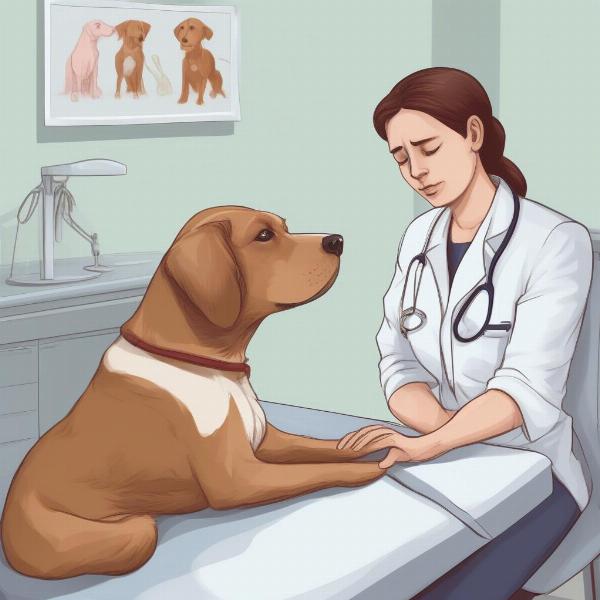A dislocated shoulder in dogs, also known as shoulder luxation, is a painful condition where the ball-and-socket joint of the shoulder becomes separated. This can happen due to trauma, such as a fall or car accident, or sometimes due to underlying joint issues. Understanding the causes, symptoms, and treatment options for a dislocated shoulder is crucial for any dog owner.
Recognizing a Dislocated Shoulder in Your Dog
If your dog has a dislocated shoulder, they’ll likely exhibit noticeable signs of discomfort. Common symptoms include limping or holding up the affected leg, swelling around the shoulder area, pain when the shoulder is touched, and reduced range of motion. The dog may also whine, whimper, or show other signs of pain.
Causes of Dislocated Shoulders in Dogs
Trauma is the most common cause of a dislocated shoulder. This can include being hit by a car, falling from a height, or even rough play. In some cases, underlying conditions like arthritis or ligament laxity can predispose a dog to shoulder dislocations. Smaller breeds may be more susceptible due to their relatively delicate bone structure.
Diagnosis and Treatment Options
If you suspect your dog has dislocated its shoulder, immediate veterinary attention is vital. The veterinarian will conduct a physical examination and likely take X-rays to confirm the diagnosis and assess the severity of the injury. Treatment options range from closed reduction, where the veterinarian manually manipulates the joint back into place, to surgical intervention, depending on the extent of damage to the surrounding ligaments and tendons.
 Veterinarian Examining Dog's Shoulder
Veterinarian Examining Dog's Shoulder
What is closed reduction for a dislocated shoulder?
Closed reduction is a non-surgical procedure where the veterinarian carefully manipulates the humeral head (the “ball” of the joint) back into the glenoid cavity (the “socket”). This procedure is often performed under sedation or anesthesia.
When is surgery necessary for a dislocated dog shoulder?
Surgery is typically required if the dislocation is recurrent, if closed reduction is unsuccessful, or if there is significant damage to the surrounding ligaments and tendons. Surgical options include stabilizing the joint with sutures, pins, or other implants.
Post-Treatment Care and Rehabilitation
After treatment, whether surgical or non-surgical, a period of restricted activity is essential to allow the shoulder to heal properly. Your veterinarian may recommend pain medication, physical therapy, ball therapy for dogs, and the use of a supportive sling or harness for dogs with arthritis to limit movement. Consistent rehabilitation and adherence to the veterinarian’s instructions are crucial for a successful recovery.
Preventing Future Dislocations
While not all dislocations are preventable, some measures can help reduce the risk. Maintaining a healthy weight for your dog can minimize stress on their joints. Using a leash during walks can prevent sudden movements that might lead to injury. Avoiding rough play with larger dogs can also be beneficial. For some breeds, a specifically designed harness may distribute weight more evenly and provide better support.
Conclusion
A dog dislocated shoulder can be a serious and painful injury. Recognizing the signs, seeking prompt veterinary care, and following post-treatment instructions are key to ensuring your dog’s recovery and preventing long-term complications. Remember that preventative measures and careful monitoring can minimize the risk of future dislocations and contribute to your dog’s overall well-being.
FAQ
- How long does it take for a dislocated dog shoulder to heal? Healing time varies depending on the severity of the injury and the treatment method. It typically takes several weeks to months for complete recovery.
- Can a dislocated shoulder heal on its own? While a shoulder might sometimes reduce itself, it’s crucial to seek veterinary attention to ensure proper healing and rule out other injuries.
- What are the signs of a dislocated shoulder in dogs? Common signs include limping, holding the leg up, swelling, pain, and reduced range of motion.
- Is surgery always necessary for a dislocated shoulder? Not always. Closed reduction is sometimes sufficient, especially for first-time dislocations with minimal damage to surrounding tissues.
- What is the prognosis for a dog with a dislocated shoulder? With proper treatment and rehabilitation, most dogs recover well from a dislocated shoulder.
- How can I prevent my dog from dislocating its shoulder again? Maintain a healthy weight, use a leash during walks, avoid rough play, and consider a supportive harness.
- What type of exercises are recommended for rehabilitation? Your veterinarian will recommend specific exercises based on your dog’s individual needs. These might include controlled leash walks, passive range of motion exercises, and swimming.
You might also be interested in these articles: dislocated shoulder in dogs, heights dog grooming and pitbull dog costumes.
About ILM Dog: ILM Dog is your trusted resource for expert advice on all aspects of dog care, from breed selection and puppy care to senior dog health and behavior training. We provide practical, up-to-date information to help you give your canine companion the best possible care. We also offer personalized consultations to address your specific concerns. For expert advice, contact us at [email protected] or call us at +44 20-3965-8624.